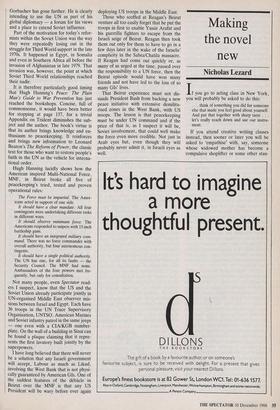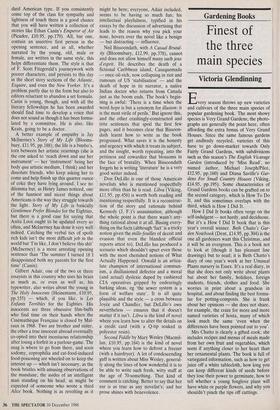Making the novel new
Nicholas Lezard
f you go to acting class in New York, you will probably be asked to do this: . . . think of something you did for someone else that made you feel good about yourself. And put that together with sharp taste . . . let's really reach down and use our instru- ment.
If you attend creative writing classes instead, then sooner or later you will be asked to 'empathise' with, say, someone whose widowed mother has become a compulsive shoplifter or some other stan- dard American type. If you consistently come top of the class for sympathy and lightness of touch there is a good chance that you will have written a collection of stories like Ethan Canin's Emperor of Air (Picador, £10.95, pp.179). All, bar one, contain an assertive first person in the opening sentence, and as all, whether narrated by the young, old, male or female, are written in the same style, this helps differentiate them. The style is that of F. Scott Fitzgerald's journeywork with poorer characters, and persists to this day in the short story sections of the Atlantic, Esquire, and even the New Yorker. It's a problem partly due to the form but also to editors reluctant to abandon a set formula. Canin is young, though, and with all the literary fellowships he has been awarded should find time to develop a voice that does not sound as though it has been formu- lated by a committee. He is also, like Keats, going to be a doctor.
A better example of empathy is Jay McInerney's Story of My Life (Blooms- bury, £11.95, pp.188); the life is a bimbo's, torn between her artistic yearnings (she is • the one asked to 'reach down and use her instrument' — her 'instrument' being her body qua artistic medium, I think) and her dissolute friends, who keep asking her to come and help finish up this quarter ounce of coke they have lying around. I see no dilemma but, as Henry James noticed, one of the funniest and nicest things about Americans is the way they struggle towards the light. Story of My Life is basically Gentlemen Prefer Blondes for the Eighties, but there is a good case for saying that Anita Loos ought to be updated every so often, and McInerney has done it very well indeed. Catching the verbal tics of spoilt rich kids isn't the most difficult job in the world but 'I'm like, I don't believe this shit' (McInerney) is a more arresting opening sentence than `The summer I turned 18 I disappointed both my parents for the first time' (Canin).
Gilbert Adair, one of the two or three essayists in this country who uses his brain as much as, or even as well as, his typewriter, also writes about the young in The Holy Innocents (Heinemann, 110.95, pp.155) — which, if you like, is Les Enfants Terribles for the Eighties. His innocents are three obsessive film-buffs who find time on their hands when the Cinematheque Francaise is closed by Mal- raux in 1968. Two are brother and sister, the other a true innocent abroad eventually co-opted into their incestuous relationship after losing a forfeit in a parlour-game. The snag is where to go from there, and soon sodomy, coprophilia and cat-food-induced food-poisoning are wheeled on to keep the interest up — which isn't necessary, as the book bristles with amusing observations of the mundane; the asides of an intelligent man standing on his head, as might be expected of someone who wrote a third Alice book. Nothing is as revolting as it might be here; everyone, Adair included, seems to be having so much fun; his intellectual playfulness, typified in his essays by the discussion of advertising that leads to the reason why you pick your nose, hovers over the novel like a benign — but distracting — influence.
Neil Bissoondath, with A Casual Brutal- ity (Bloomsbury, £12.99, pp378), cannot and does not allow himself many such jeux d'esprit. He describes the death of a fictional Caribbean island, Casaquemada — once oil-rich, now collapsing in riot and rumours of US 'stabilisation' — and the death of hope in its narrator, a native Indian doctor who returns from Canada just as the boom ends. The book's begin- ning is awful: 'There is a time when the word hope is but a synonym for illusion: it is the most virile of perils.' But ignore this, and the other crashingly-constructed and trite sentences that spoil the first few pages, and it becomes clear that Bissoon- dath learnt how to write as the book progressed. What saves it is the honesty and urgency with which it treats its subject, and the insight, worth repeating, into the pettiness and cowardice that blossoms in the face of brutality. When Bissoondath forgets he is writing 'literature' he is a very good writer indeed.
Don DeLillo is one of those American novelists who is mentioned respectfully more often than he is read. Libra (Viking, £11.95, pp.456) is worth both reading and mentioning respectfully. It is a reconstruc- tion of the story and rationale behind Kennedy (J. F.)'s assassination, although the whole point is that there wasn't any- thing rational about it at all. Basing every- thing on the facts (although 'fact' is a tricky notion given the mille-feuilles of deceit and evasion that even the blandest official reports attest to), DeLillo has produced a scenario which shouldn't upset even those with the most cherished notions of What Actually Happened. Oswald is an articu- late champion of international commun- ism, a disillusioned defector and a moral (and actual) dyslexic duped by cashiered CIA operatives gripped by endearingly barking ideas, eg 'the sewer system is a form of welfare state'. It is all quite plausible and the style — a cross between Joyce and Chandler, but DeLillo's own nevertheless — ensures that it doesn't matter if it isn't. Libra is the kind of novel where you learn how to alter the details on a credit card (with a 0-tip soaked in polyester resin).
Second Fiddle by Mary Wesley (Macmil- lan, £10.95, pp.184) is the kind of novel where you learn how to defrost a freezer (with a hairdryer). A lot of condescending guff is written about Miss Wesley, general- ly along the lines of how wonderful it is to be able to write such fresh, witty stuff at the age of 70-something. That kind of comment is catching. Better to say that her ear is as true as any novelist's; and her prose shines with benevolence.



























































 Previous page
Previous page